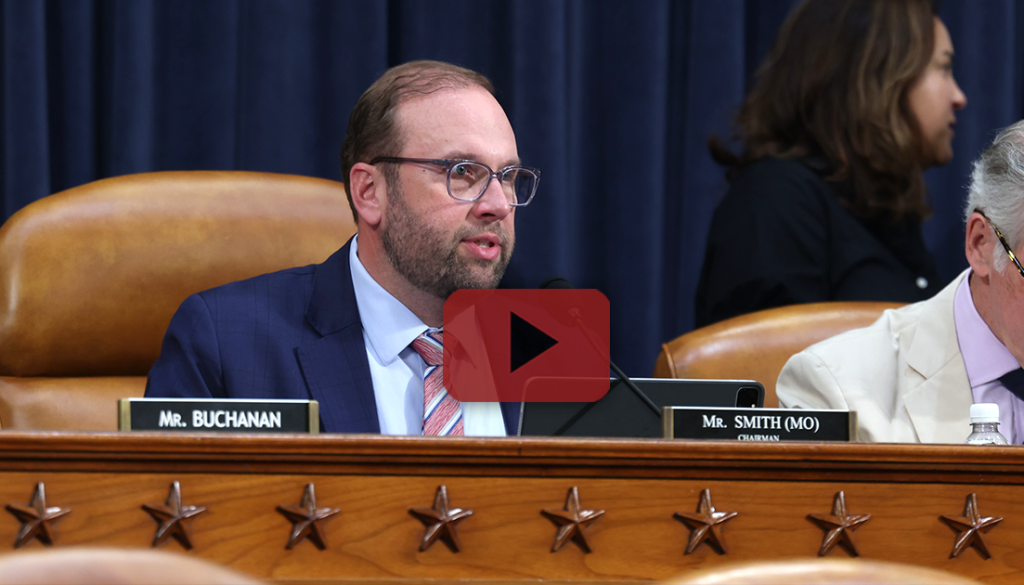Legislation provides seniors with coverage of anti-obesity medication, cancer screening, and breakthrough medical devices.
WASHINGTON, D.C. – Seniors will have greater access to innovative medication and treatments thanks to bipartisan bills approved by the Ways and Means Committee. The legislation requires Medicare to cover certain cutting-edge medications, screenings tests, and devices.
For the first time, millions of Americans aging into Medicare will not lose their coverage of anti-obesity medication as they transition into the program. Other legislation approved by the Committee opens the door for Medicare beneficiaries to get coverage for blood tests that can detect multiple cancers early and breakthrough medical devices. Access to these drugs, screenings, and devices will help bring down health care costs for seniors and help reduce government health spending in the long-term. In addition, the Committee passed legislation to streamline and improve the process for determining Medicare coverage for breakthrough medical devices.

In his opening statement, Ways and Means Committee Chairman Jason Smith (R-MO) said that seniors should not be denied the latest innovative medicines that offer the promise of better health:
“American innovation has delivered some of the world’s greatest medical breakthroughs that have saved countless lives while improving the quality of life for millions more. With these technologies, treatments, and medicine, we have found new ways to treat old diseases. We can help not only Americans live healthier, but also bring down long-term health care expenses. The only thing standing in the way of a better life for seniors and these new treatments are outdated and burdensome government rules and regulations.
“Each bill considered today cuts that red tape and gives seniors access to advanced, cutting-edge medicine.”
The Nancy Gardner Sewell Medicare Multi-Cancer Early Detection Screening Coverage Act (H.R. 2407)
Introduced by Representative Jodey Arrington (R-TX) and Representative Terri Sewell (D-AL), the bill expands Medicare coverage to cover multi-cancer early detection screening tests.
- Provides transitional Medicare coverage and reimbursement for FDA-approved multi-cancer early detection screening tests for a first group of beneficiaries most impacted by early screening until a traditional coverage decision is issued with coverage expanded to all.
- Newly eligible Medicare beneficiaries, and those becoming eligible within the next few years, will receive access to covered multi-cancer screening tests, with those individuals continuing to receive coverage in perpetuity.
- This policy ensures timely coverage of innovative cancer screening tests so at-risk Medicare patients can receive the care and treatment needed to live healthier lives.
Read the one pager here.
The bill passed the Committee 38-0.
The American Medical Innovation and Investment Act (H.R. 8816)
Introduced by Health Subcommittee Chairman Vern Buchanan (R-FL), the bill improves Medicare’s process for granting coverage of breakthrough medical devices.
- Prohibits CEDs from lasting longer than 10 years unless agreed upon by the applicant, guarantees a determination whether a request for a NCD is complete within 90 days, and prohibits LCDs from being more restrictive than existing NCDs.
- Requires Medicare to clarify and update coverage for AI-enabled dosing devices and PDTs.
- Guarantees coverage of self-administered home infusion pumps.
- Provides a budget-neutral pilot program for medically tailored meals for seniors.
- Requires cognitive impairment tests for Alzheimer’s to be conducted with up-to-date devices.
Read the one pager here.
The bill passed the Committee 40-0.
The Ensuring Patient Access to Critical Breakthrough Products Act (H.R. 1691)
Introduced by Dr. Brad Wenstrup (R-OH) and Rep. Suzan DelBene (D-WA), the bill builds on a Trump Administration rule and extends Medicare coverage to breakthrough medical devices.
- Provides a distinct pathway for immediate four years of transitional Medicare coverage of breakthrough medical devices – mirroring the Trump Administration final rule and requires the Centers for Medicare and Medicaid Services (CMS) to make a permanent coverage determination by the end of the coverage period.
- This expedited coverage pathway will encourage more innovative medical devices to come to market and provide Medicare patients with needed treatments and cures quicker.
Read the one pager here.
The bill passed the Committee 36-5.
The Treat and Reduce Obesity Act (H.R. 4818)
Introduced by Dr. Brad Wenstrup (R-OH) and Rep. Gwen Moore (D-WI), the bill expands Medicare coverage to anti-obesity medication (AOM) for seniors already using one of these drugs.
- Provides Medicare Part D coverage of AOMs to individuals aging into Medicare who are currently being treated by an AOM, ensuring they do not lose coverage for their effective therapies.
- Without this coverage, 1.25 million patients are projected to lose coverage over the next decade as they transition into Medicare, driving up long-term health costs.
- Requires Medicare to re-evaluate its coverage of “Intensive Behavioral Therapy” (IBT) so that seniors can be effectively treated through diet and exercise.
- Requires MedPAC to report on the coverage of AOMs in pre-Medicare markets and how use among those populations may affect usage by enrollees to lay the groundwork for expanded coverage to more individuals.
Read the one pager here.
The bill passed the Committee 36-4.
